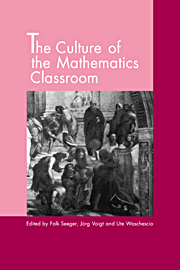Book contents
- Frontmatter
- Contents
- List of contributors
- Acknowledgments
- Introduction
- Part I Changing classroom culture
- 1 Joint activity in mathematics classrooms: A Vygotskian analysis
- 2 Evolution of classroom culture in mathematics, teacher education, and reflection on action
- 3 Reorganizing the motivational sphere of classroom culture: An activity-theoretical analysis of planning in a teacher team
- 4 The practice of teaching mathematics: Experimental conditions of change
- Part II Classroom processes
- Part III Epistemology and classroom culture
- Part IV Outlook
- Author index
- Subject index
4 - The practice of teaching mathematics: Experimental conditions of change
Published online by Cambridge University Press: 03 May 2010
- Frontmatter
- Contents
- List of contributors
- Acknowledgments
- Introduction
- Part I Changing classroom culture
- 1 Joint activity in mathematics classrooms: A Vygotskian analysis
- 2 Evolution of classroom culture in mathematics, teacher education, and reflection on action
- 3 Reorganizing the motivational sphere of classroom culture: An activity-theoretical analysis of planning in a teacher team
- 4 The practice of teaching mathematics: Experimental conditions of change
- Part II Classroom processes
- Part III Epistemology and classroom culture
- Part IV Outlook
- Author index
- Subject index
Summary
The following text is a report on an individual learning process concerning the author's own teaching practice. The experiences give rise to the hope that – within certain limits – mathematics teaching may be improved by increased awareness among teachers. So the underlying basic questions are
How can I – in teaching mathematics – become aware of the initial richness of the subject, the viewpoint and the aims of my considerations, as well as the applied strategies and tools? and
How can I reveal them to the learners, taking into account their viewpoints as well as possible?
Classical teacher education – burden or help?
My practical training as a mathematics teacher at a German gymnasium made claims that I even then felt to be hardly implemented. This training would lead the pupils “as smoothly and elegantly as possible … along systematically prepared paths to systematically predetermined outcomes” (Andelfinger 1987: 3). My instructor, whom I very much appreciated, signaled this norm by tending to assess the lessons according to their planning – which may or may not have been “right.”
This manifested a view that the planning of lessons could be optimized with respect to a systematic implementation. That optimization was
a neat mixture of anticipation of learning difficulties and control over the learning process by means of a methodically smooth and conclusive presentation of the subject matter as well as a questioning–developing teaching style
location of the whole responsibility for the progress of the lesson in the hand of the teacher herself.
- Type
- Chapter
- Information
- The Culture of the Mathematics Classroom , pp. 104 - 124Publisher: Cambridge University PressPrint publication year: 1998
- 3
- Cited by



